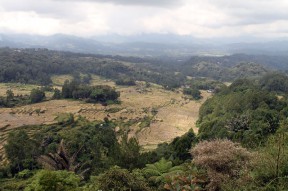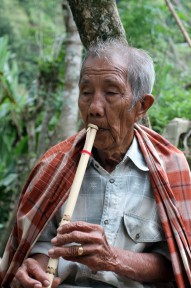People of the uplands – Tana Toraja, Sulawesi, Indonesia

This is part I in a series about Toraja, view other parts: Part II, Part III, Part IV
The Bugis people, mainly focussed around the south of south Sulawesi, call them ‘to riaja’ in their language: the people of the uplands. The Dutch colonial government called them toraja in 1909 and it stuck. The mountain region they live in is called Tana Toraja, or land of the Toraja. It is strikingly beautiful, its valleys filled with rice fields, its mountains covered in forests and their tops often disappearing into the clouds.
 Small towns and villages are scattered across the region and the mountainous terrain makes visiting them rather challenging at times, especially since roads have often vanished completely in places and instead are nothing more but rocky paths. A trip from Makassar to Toraja today still takes about twelve hours in a modern bus over semi-existing roads. It is little wonder then that, even though the Dutch East Indies Company established a base in Makassar in the early 17th century, they never bothered venturing up the mountains to Toraja, especially since it didn’t seem to produce anything interesting. This changed once Islam started spreading to Sulawesi in the late 19th century and they got so concerned they quickly sent up missionaries to the Torajan people hoping to convert them to Christianity.
Small towns and villages are scattered across the region and the mountainous terrain makes visiting them rather challenging at times, especially since roads have often vanished completely in places and instead are nothing more but rocky paths. A trip from Makassar to Toraja today still takes about twelve hours in a modern bus over semi-existing roads. It is little wonder then that, even though the Dutch East Indies Company established a base in Makassar in the early 17th century, they never bothered venturing up the mountains to Toraja, especially since it didn’t seem to produce anything interesting. This changed once Islam started spreading to Sulawesi in the late 19th century and they got so concerned they quickly sent up missionaries to the Torajan people hoping to convert them to Christianity.
The first missionary to arrive in Tana Toraja proudly proclaimed all people were equal in front of God and the Torajans proudly proclaimed that they weren’t and proceeded to kill the blasphemous idiot. People, as any good Torajan knows, are created in different classes and they weren’t interested in anyone telling them otherwise. There were nobles, commoners and slaves in Torajan society and they planned on keeping it that way. Besides, their slave trade was a lucrative business and who were the Dutch to tell them to stop it? And what was up with all this tax nonsense? The Torajans had their own belief system called Aluk, or ‘the way’ and besides telling them what to believe, it also dictated laws and customs.
T he Torajans were not buying what the Christian missionaries were selling and only when the neighboring people of Sulawesi who had converted to Islam started attacking them did the conversion rate increase. Converting to Christianity then meant political protection by the Dutch. As late as the 1950s, still only about 10% had converted to Christianity. Following Indonesian independence large scale religious wars broke out in Sulawesi, converting more and more of the Torajans to Christianity.
he Torajans were not buying what the Christian missionaries were selling and only when the neighboring people of Sulawesi who had converted to Islam started attacking them did the conversion rate increase. Converting to Christianity then meant political protection by the Dutch. As late as the 1950s, still only about 10% had converted to Christianity. Following Indonesian independence large scale religious wars broke out in Sulawesi, converting more and more of the Torajans to Christianity.
Today, the majority of Torajan are considered Christian, but their traditional ways and beliefs in Aluk still dominate much of modern day life. The way the Torajan cope with death is quite unique and for me, as well as most other visitors, the main reason to come here. More on that in the days to come.

